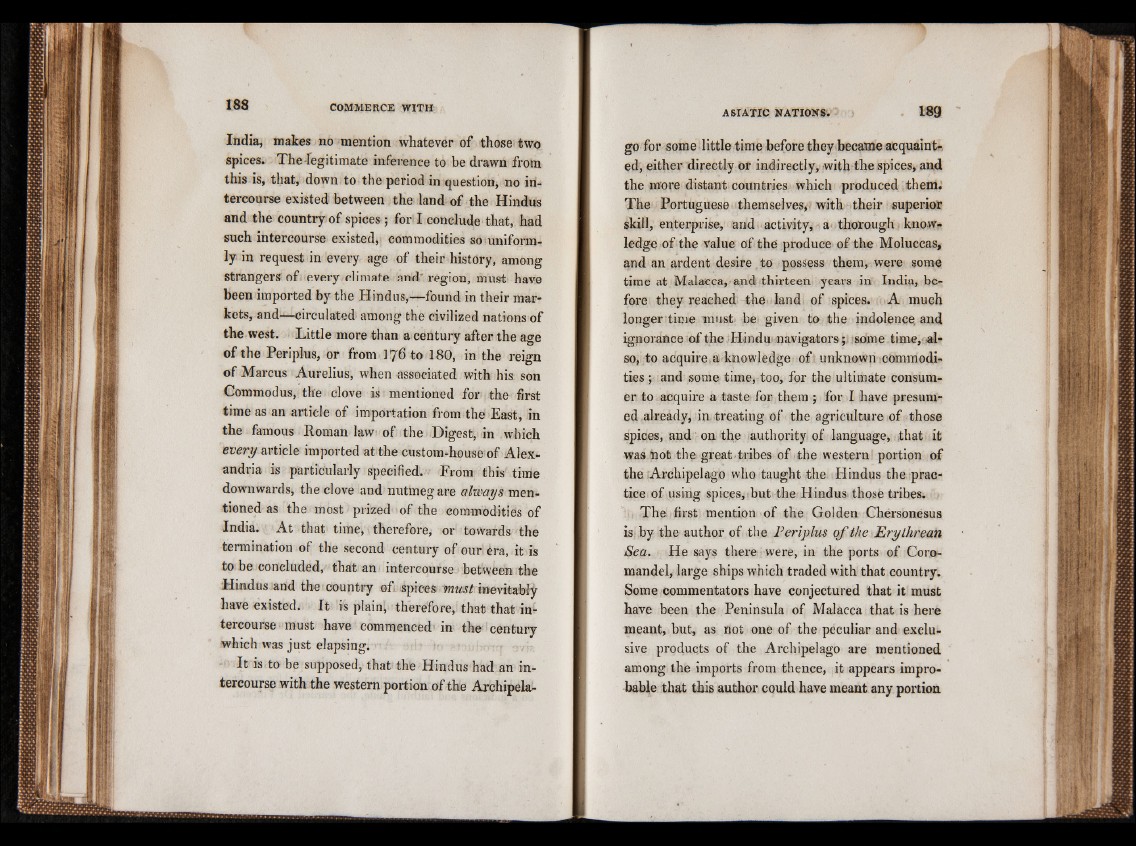
India, makes no mention whatever of those two
spices. The-legitimate inference to be drawn from
this is, that, down to the period in question, no intercourse
existed between the land of the Hindus
and the country of spices ; for I conclude that, had
such intercourse existed* commodities so uniformly
in request in every age of their history, among
strangers of every climate and' region, must have
been imported by the Hindus,—found in their markets,
and—circulated among the civilized nations of
the west. Little more than a century after the age
of the Periplus, or from 176 to 180, in the reign
of Marcus Aurelius, when associated with his son
Commodus, the clove is mentioned for the first
time as an article of importation from the East, in
the famous Roman law of the Digest, in which
every article imported at the custom-house of Alexandria
is particularly specified. From this time
downwards, the clove and nutmeg are always mentioned
as the most prized of the commodities of
India. At that time, therefore, or towards the
termination of the second century of our era, it is
to be concluded, that an intercourse I between the
Hindus and the country of spices must inevitably
have existed. It is plain, therefore, that that intercourse
must have commenced'in the century
which was just elapsing.
It is to be supposed, that the Hindus had an intercourse
with the western portion of the Arehipelago
for some little time before they became acquainted,
either directly or indirectly, with the spices, and
the more distant countries which produced them.
The Portuguese, themselves, with their superior
skill, enterprise, and activity, a thorough knowledge
of the value of the produce of the Moluccas,
and an ardent desire to possess them, were some
time at Malacca, and thirteen years in India, before
they reached the land of spices. A much
longer ;time must be given to the indolence, and
ignorance of the Hindu navigators; some time, also,
to acquirer knowledge, of unknown commodities
; and some time, too, for the ultimate consumer
to acquire a taste for them ; for I have presumed
already, in treating of the agriculture of those
spices, and on the .authority of language, ¡ that it
was not the great , tribes of the western portion of
the Archipelago who taught the Hindus the practice
of using spices,.but the Hindus those tribes.
The first mention oF the Golden Chérsonésus
is by the author of the Periplus of the Erythrean
Sea. He says there were, in the ports of Coromandel,
large ships which traded with that country.
Some commentators have conjectured that it must
have been the Peninsula of Malacca that is here
meant, but, as not one of the peculiar and exclusive
products of the Archipelago are mentioned
among the imports from thence, it appears improbable
that this author could have meant any portion